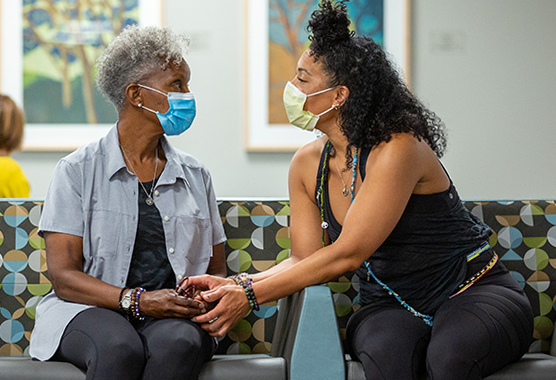Bladder Cancer
Our team includes every specialist you need for comprehensive bladder cancer treatment. You have access to the most advanced therapies for any stage and type of bladder cancer.
Medically reviewed by Marc Dall'Era, M.D. on Dec. 07, 2023.

What Is Bladder Cancer?
Bladder cancer affects your bladder, the hollow organ in your pelvic area that holds urine. The most common type of bladder cancer is urothelial carcinoma, which makes up more than 95% of cases. Other types of bladder cancer include squamous cell carcinoma, adenocarcinoma and small cell carcinoma of the bladder.
Most cases of bladder cancer are non-muscle invasive. This means the cancer only affects your bladder’s inner lining. Muscle invasive bladder cancer is less common and affects your bladder muscle and sometimes other organs.
UC Davis Comprehensive Cancer Center is a leader in treating all types of bladder cancer, including rare and complex cases. Our urologic oncology team provides the most advanced treatments, including minimally invasive procedures that don’t require bladder removal.
Bladder Cancer Symptoms
Symptoms can be difficult to detect in the early stages of bladder cancer. People may mistake them for conditions like a urinary tract infection (UTI) or an enlarged prostate. See your provider if you have any of these symptoms. Early diagnosis and treatment lead to better outcomes.
Early Stage Symptoms
The most common symptoms of early bladder cancer include:
- Blood in your urine that may be bright red or rust-colored
- Burning or pain while urinating
- Frequent urge to urinate, even if you just used the bathroom
- Trouble getting urine out
- Urinating more often than usual, especially at night
- Weak urine stream
Later-Stage Symptoms
If bladder cancer becomes more advanced, you may experience:
- Fatigue or weakness
- Inability to urinate
- Loss of appetite
- Lower back pain on one side
- Swelling in your feet
- Weight loss
Causes and Risk Factors of Bladder Cancer
Bladder cancer occurs when DNA in a bladder cell becomes damaged. This damaged cell divides and forms new abnormal cells, which multiply uncontrollably. Over time, these cells form a tumor that can grow and spread.
Experts cannot always pinpoint why these DNA changes happen. But at UC Davis Comprehensive Cancer Center, we continue to look for answers. Our physician-scientists are at the forefront of bladder cancer research, exploring potential causes, new testing options and groundbreaking treatments.
Certain factors can make you more likely to develop bladder cancer, including:
Tobacco Use
Smoking cigarettes is the biggest risk factor for bladder cancer. Cigarettes contain harmful chemicals that collect in your urine and harm the cells in your bladder.
Arsenic Exposure
Arsenic is a heavy metal that may contaminate drinking water in some parts of the world. In the U.S., the risk of having arsenic in your water is very low.
Bladder Conditions
People born with a bladder birth defect may be more likely to develop bladder cancer. You may also have a higher risk if you frequently get UTIs or bladder stones.
Chemical Exposure
Chemicals from working with dyes, leather, rubber, paint, textiles and vehicle exhaust can cause bladder cancer. Your risk is even higher if you smoke and work around these chemicals.
Genetics
If a parent or sibling has bladder cancer, you are more likely to have it. People with retinoblastoma, Cowden syndrome and Lynch syndrome also have a higher risk.
Medications and Supplements
The Chinese herb Aristolochia fangchi could raise your risk of bladder cancer. Previously taking certain anticancer drugs or having radiation therapy on your pelvis may also increase your risk.
Bladder Cancer Diagnosis and Testing
If you have signs of blood in your urine, our specialists perform advanced tests to determine the cause. Our pathologists study a urine sample under a microscope to look for signs of cancer.
If bladder cancer is suspected, your physician may perform a cystoscopy to look in the bladder with a little camera. We may use imaging tests such as CT scan or MRI to examine your bladder and surrounding organs.
Bladder Cancer Treatments at UC Davis Health
Our specialists take a personalized approach to your care, evaluating which therapies will be best for you. Your treatment may include:
Transurethral Resection of Bladder Tumor (TURBT)
This minimally invasive procedure identifies and removes early-stage bladder tumors without major surgery. Our specialists use leading-edge technology to remove cancer while sparing healthy tissue. Our center is one of the few in the nation to offer blue-light fluorescent cystoscopy. This procedure highlights small, early stage bladder cancers that are difficult to detect with standard white-light cystoscopy. This advanced technology allows us to remove tumors earlier and reduce the chance of cancer returning.
Chemotherapy
Chemotherapy medication can treat cancer that has spread beyond your bladder and may help prevent recurrence. You receive a personalized plan with the type and dosage that will be most effective for you.
Intravesical Therapy
During this procedure, we place cancer-fighting medicine directly in your bladder.
Immunotherapy
Immunotherapy medications help your immune system find and attack cancer cells. Our experienced team offers immunotherapy for early-stage and advanced bladder cancers, including the newest drugs through clinical trials.
Radiation Therapy
Specialists in our Department of Radiation Oncology provide state-of-the-art treatment for bladder cancer. Our team has expertise in image-guided radiation therapy (IGRT), which targets bladder tumors with pinpoint precision.
Targeted Therapy
Targeted therapy is a group of drugs that attack specific parts of a cancer cell. We use genetic tests to identify a medication that can effectively target the tumor cells.
Bladder Cancer Prevention
There is no way to completely eliminate your risk of bladder cancer, but these steps can help reduce it:
Don’t Smoke
It’s estimated that smoking may cause half of all bladder cancers. If you smoke, try to quit.
Drink Water
Drink plenty of water each day. Staying hydrated helps flush harmful substances out of your bladder.
Eat Fruits and Vegetables
Eating a diet with plenty of fruits and vegetables could help prevent some cases of bladder cancer.
Limit Chemical Exposure
Follow workplace safety practices to avoid unnecessary exposure to chemicals.
Can Bladder Cancer Be Prevented?” American Cancer Society, https://www.cancer.org/cancer/types/bladder-cancer/causes-risks-prevention/prevention.html
“What Is Bladder Cancer?” American Cancer Society, https://www.cancer.org/cancer/types/bladder-cancer/about/what-is-bladder-cancer.html
About 9 in 10 people are ages
56And older when diagnosed with bladder cancer
Bladder cancer is the
4thMost common cancer in men
Source: American Cancer Society: Key Statistics for Bladder Cancer
Request an Appointment
As Sacramento's No. 1 hospital, you'll benefit from unique advantages in primary care and specialty care. This includes prevention, diagnosis and treatment options from experts in 150 specialties.
Referring Physicians
To refer a patient, you can submit an electronic referral form or call.
800-4-UCDAVIS
Patients
For questions and appointment information
Consumer Resource Center
800-2-UCDAVIS

Ranked among the nation’s best hospitals
A U.S. News & World Report best hospital in cancer, cardiology, heart & vascular surgery, diabetes & endocrinology, ENT, geriatrics, neurology & neurosurgery, obstetrics & gynecology, and pulmonology & lung surgery.

Ranked among the nation’s best children’s hospitals
A U.S. News & World Report best children’s hospital in diabetes & endocrinology, nephrology, and orthopedics*. (*Together with Shriners Children’s)

Ranked Sacramento’s #1 hospital
Ranked Sacramento’s #1 hospital by U.S. News, and high-performing in COPD, colon cancer surgery, diabetes, heart attack, heart failure, hip fracture, hip replacement, kidney failure, leukemia, lymphoma & myeloma, lung cancer surgery, ovarian cancer surgery, pneumonia, prostate cancer surgery, stroke, TAVR, uterine cancer surgery, gastroenterology & GI surgery, and orthopedics.

The nation’s highest nursing honor
UC Davis Medical Center has received Magnet® recognition, the nation’s highest honor for nursing excellence.

“Most Wired” for acute care
UC Davis Health has been recognized as a level 10 out of 10 in the Digital Health “Most Wired” program from the College of Healthcare Information Management Executives (CHIME). The honor recognizes excellence in using technology to improve the delivery of care.

“Most Wired” for ambulatory care
UC Davis Health has been recognized as a level 10 out of 10 in the Digital Health “Most Wired” program from the College of Healthcare Information Management Executives (CHIME). The honor recognizes excellence in using technology to improve the delivery of care.

World-class cancer care
One of ~56 U.S. cancer centers designated “comprehensive” by the National Cancer Institute.

A leader in health care equality
For the 11th consecutive year, UC Davis Medical Center has been recognized as a “Leader in LGBTQ+ Healthcare Equality.”

